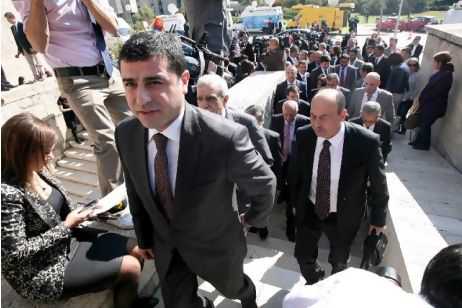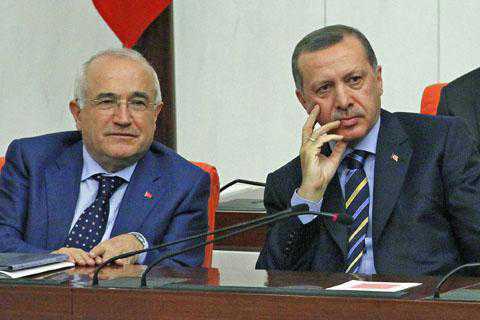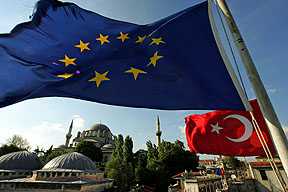End of Kurdish MPs’ boycott raises hopes for new constitution in Turkey
Thomas Seibert

ISTANBUL // The decision by Turkey’s main Kurdish party to end a parliamentary boycott has boosted hopes for a political consensus on a new constitution that could help solve the Kurdish question.
But as Kurdish deputies took their oaths of office during Saturday’s first session of parliament after the summer break, and government and opposition promised to support all-party talks about a new constitution, continuing violence in the Kurdish region served as a reminder of how difficult the road to peace is likely to be.
Recep Tayyip Erdogan, the Turkish prime minister, said last week that he hoped for an agreement on a constitution within the first six months of the coming year.
On Saturday, he added that he was prepared to have Turkey’s intelligence service take up new negotiations with Kurdish rebels, sworn enemies of Ankara.
There is broad agreement among politicians, non-governmental groups and academics that Turkey, a rising regional power and an EU candidate country, needs to replace its constitution, which was written under military rule in 1982 and includes many regulations restricting democracy.
But opinions about how the new one should look differ widely.
Mr Erdogan’s ruling Justice and Development Party (AKP), which raked in almost 50 per cent of the vote in parliamentary elections in June, has started preliminary talks with two opposition parties, the secularist Republican People’s Party (CHP) and the right-wing Nationalist Movement Party (MHP), about the shape of negotiations on the constitution.
The parties agreed to set up a special committee for work on the new basic law.
In a step widely seen as reaching out to the Kurds, the prime minister said the AKP would seek talks in the coming days with the Party for a Democratic Society (BDP), the main Kurdish party.
The BDP won about 30 seats in June but refused to send its deputies to parliament, in protest against the imprisonment of a colleague.
The party decided last week to end the boycott so it would not be left out of the constitutional talks.
The BDP parliamentary group established after the oath-taking on Saturday includes Leyla Zana, a legendary Kurdish politician who spent 10 years in prison after speaking Kurdish during her first oath-taking in parliament in 1991, and Erol Dora, Turkey’s first Christian deputy since the 1960s.
But for all the symbolism and the hope for a speedy agreement on a new basic law, politicians and analysts alike warn that negotiations will not be easy.
Selahattin Demirtas, the BDP leader, said after a meeting with Abdullah Gul, Turkey’s president: “We have entered a tough new phase.”
Turkish courts have jailed numerous BDP members for suspected links to the banned Kurdistan Workers’ Party (PKK), a rebel group that has been fighting against the Turkish state since 1984.
Just as politicians in Ankara get ready to tackle the question of whether to enshrine cultural rights of minority groups like Turkey’s estimated 12 million Kurds in the new constitution, the PKK has stepped up its violent campaign in the Kurdish region.
While increasing attacks on outposts of the military and the police, PKK fighters have also started to target civilians.
Twelve teachers, seen by the PKK as representatives of a system that suppresses Kurdish language rights, have been kidnapped by rebels in recent days.
Two weeks ago, four female civilians were killed in a PKK attack in the province of Siirt. The rebels later apologised for the deaths.
Last week, a pregnant woman and her 4-year-old daughter were killed in another shoot-out between PKK members and the police in Batman.
Police say the woman and the girl were shot by PKK members but pro-Kurdish media say police bullets killed them.
As a response to the increase in attacks by the PKK which started in August, Mr Erdogan has ordered airstrikes on rebel camps in northern Iraq.
The government is also asking parliament to extend a mandate for cross-order operations of the armed forces, which would enable Ankara to strike at the PKK in Iraq with an intervention by ground forces.
Mithat Sancar, a law professor at Ankara University, said: “There is a logic of war on both sides.” But while the state was trying to weaken the PKK militarily to force it to accept a solution, the rebels were convinced the state would solve the Kurdish question only under pressure of violence, he said “It is a vicious circle,” Mr Sancar said.
The violence had the potential to derail the political process that was about to begin with the constitutional negotiations, he said.
However, Mr Sancar said, there were also signs of hope, such as the BDP’s return to parliament and Mr Erdogan’s willingness to talk to the Kurdish party.
“This demonstrates that both sides are expecting something from a peaceful process,” Mr Sancar said.
“Both sides are aware that violence is a dead-end street.”
via End of Kurdish MPs’ boycott raises hopes for new constitution in Turkey – The National.



